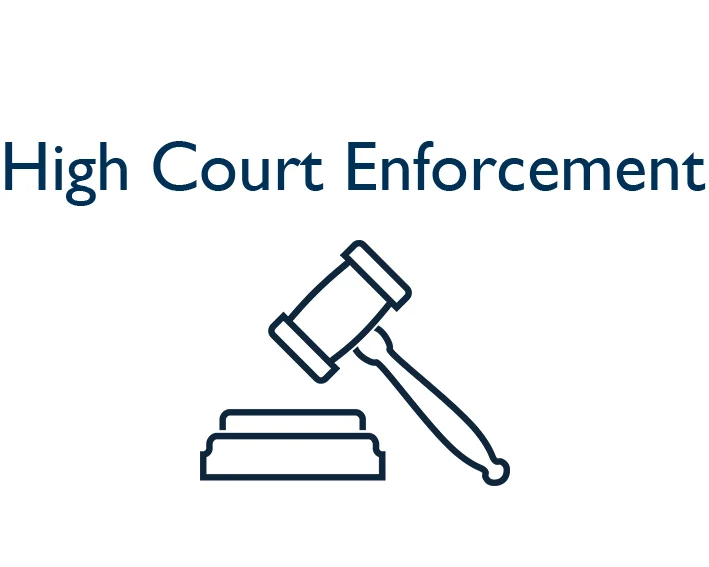High court enforcement
Recover your debt today
If you have an unpaid County Court Judgment or Order over £600 less than 6 years old, we can help.
What is a High Court Enforcement Officer?
A High Court Enforcement Officer (HCEO) is an officer of the High Court of England and Wales responsible for enforcing judgments of the High Court, often by seizing goods or repossessing property. High Court Enforcement Officers have greater powers than County Court Bailiffs, typically operating a faster, out of hours recovery service.
A High Court Enforcement Officer can to enforce County Court Judgments (CCJs) over the value of £600 by transferring the debt up to the High Court.
High Court Enforcement Services
If you’re looking for effective, industry-leading enforcement services, get in touch with Dukes today. We work in partnership with one of the leading High Court Enforcement specialists, Quality Bailiffs. With award-winning Agents, and some of the highest recovery rates in the industry, you can trust Dukes to deliver exceptional results.
Alongside High Court Enforcement, we provide a range of debt recovery services from Commercial Debt Collection to Traveller Eviction.
How to recover your County Court Judgments (CCJs)
Once you obtain a CCJ, you have a choice of how to recover the debt. If the debt value is £5,000 or more you must use High Court for recovery, however if the debt is between £600 and £5,000 you have a choice:
Use the County Court Bailiff via money claim online or the issuing court
Have the case transferred up from the County Court up to the High Court for enforcement
County Court Bailiffs Vs High Court Enforcement Officers
Transferring your debt up to the High Court is the most effective way to recover your debt, because long delays in the County Court and overstretched civil servants are not helping UK businesses and individuals who are trying to recover money owed to them. What’s more, County Court Bailiffs provide a different level of service; they’re paid regardless of the outcome, therefore processes and attitudes to recovery are typically not as well-thought out or as meticulous as that from High Court Enforcement Officers.
We recommend, once you have secured your judgment, you transfer the debt up to the High Court for enforcement for the most effective way to recover the debt.
The process: transferring the CCJ to the High Court
We take all of the administration away for you.
Once you instruct us, our partners’ dedicated in-house transfer up team can obtain a High Court Writ on your behalf. Once this is completed (typically within 5 - 21 days) Quality Bailiffs will undertake comprehensive tracing and investigations. They aim to collect at the earliest possible stage without the requirement to remove and sell goods at auction.
When transferring your debt, Quality Bailiffs offer two types of service:
Standard Service - For customers only requiring email support during the recovery process.
Premier Service - For customers wanting telephone support and assistance with the recovery process. Premier service also offers additional benefits.
Your questions answered
-
High Court Enforcement Officers have greater powers than County Court Bailiffs, typically operating a faster, out of hours recovery service.
-
High Court Enforcement Officers can only charge recovery fees once the debt is recovered successfully, therefore, you’ll not pay us a penny until you get what’s rightfully yours.
-
High Court Enforcement is suitable for:
Individuals and businesses conducting their own litigation and legal matters
Individuals and businesses with experience dealing with debt recovery
Legal professionals


